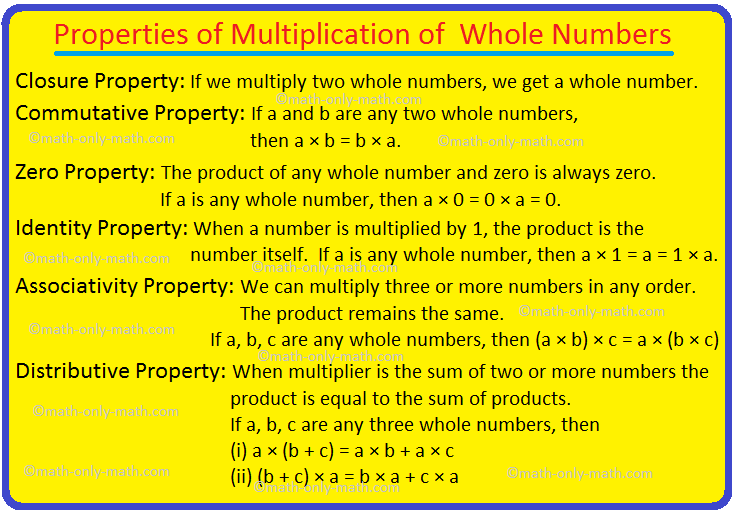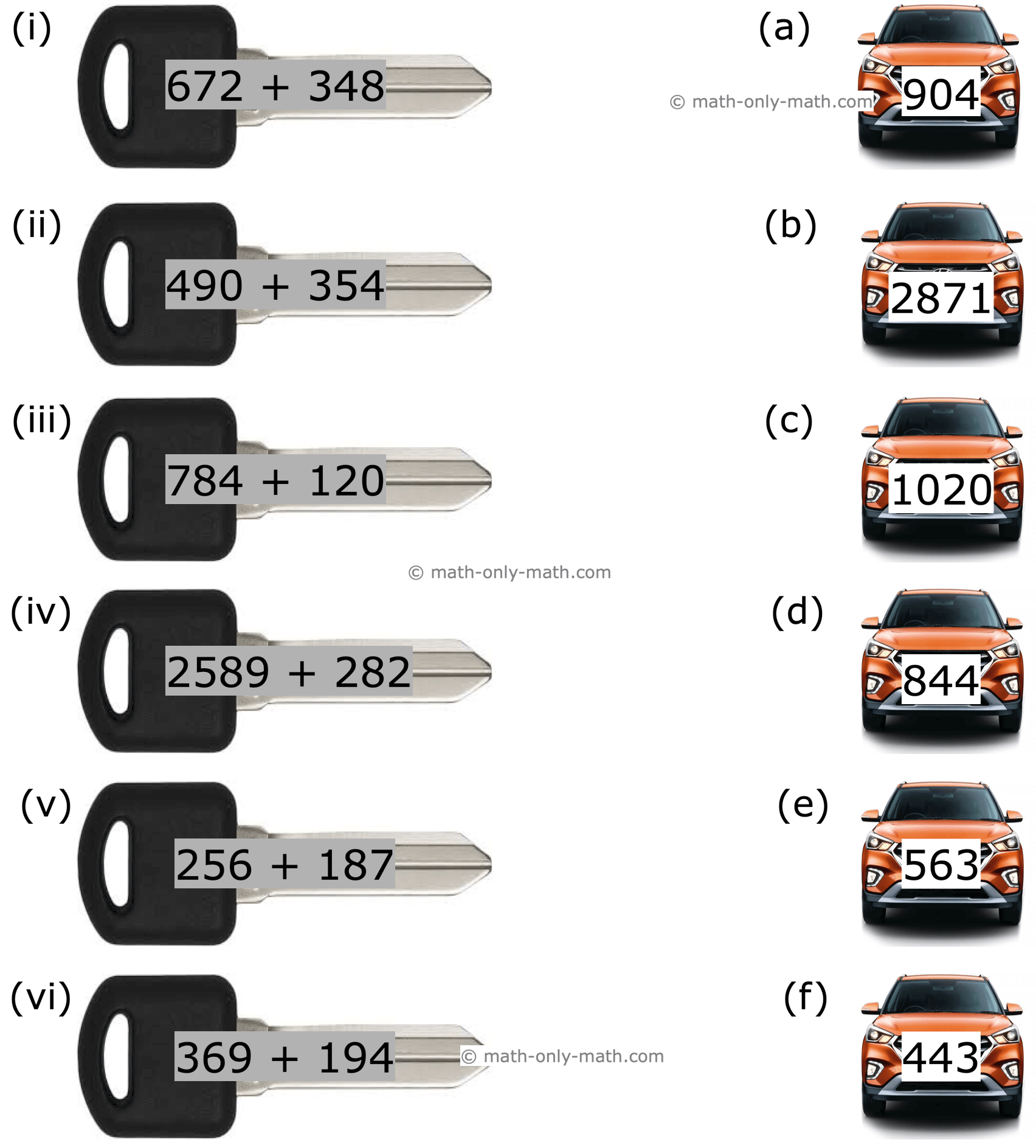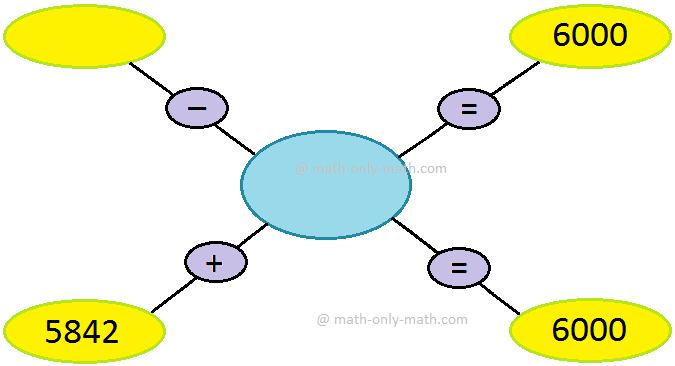Complex Roots of a Quadratic Equation
We will discuss about the complex roots of a quadratic equation.
In a quadratic equation with real coefficients has a complex root α + iβ then it has also the conjugate complex root α - iβ.
Proof:
To prove the above theorem let us consider the quadratic equation of the general form:
ax\(^{2}\) + bx + c = 0 where, the coefficients a, b and c are real.
Let α + iβ (α, β are real and i = √-1) be a complex root of equation ax\(^{2}\) + bx + c = 0. Then the equation ax\(^{2}\) + bx + c = 0 must be satisfied by x = α + iβ.
Therefore,
a(α + iβ)\(^{2}\) + b(α + iβ) + c = 0
or, a(α\(^{2}\) - β\(^{2}\) + i ∙ 2 αβ) + bα + ibβ + c = 0, (Since, i\(^{2}\) = -1)
or, aα\(^{2}\) - aβ\(^{2}\) + 2iaαβ + bα + ibβ + c = 0,
or, aα\(^{2}\) - aβ\(^{2}\) + bα + c + i(2aαβ + bβ) = 0,
Therefore,
aα\(^{2}\) - aβ\(^{2}\) + bα + c = 0 and 2aαβ + bβ = 0
Since, p + iq = 0 (p, q are real and i = √-1) implies p = 0 and q = 0]
Now substitute x by α - iβ in ax\(^{2}\) + bx + c we get,
a(α - iβ)\(^{2}\) + b(α - iβ) + c
= a(α\(^{2}\) - β\(^{2}\) - i ∙ 2 αβ) + bα - ibβ + c, (Since, i\(^{2}\) = -1)
= aα\(^{2}\) - aβ\(^{2}\) - 2iaαβ + bα - ibβ + c,
= aα\(^{2}\) - aβ\(^{2}\) + bα + c - i(2aαβ + bβ)
= 0 - i ∙ 0 [Since, aα\(^{2}\) - aβ\(^{2}\) + bα + c = 0 and 2aαβ + bβ = 0]
= 0
Now we clearly see that the equation ax\(^{2}\) + bx + c = 0 is satisfied by x = (α - iβ) when (α + iβ) is a root of the equation. Therefore, (α - iβ) is the other complex root of the equation ax\(^{2}\) + bx + c = 0.
Similarly, if (α - iβ) is a complex root of equation ax\(^{2}\) + bx + c = 0 then we can easily proved that its other complex root is (α + iβ).
Thus, (α + iβ) and (α - iβ) are conjugate complex roots. Therefore, in a quadratic equation complex or imaginary roots occur in conjugate pairs.
Solved example to find the imaginary roots occur in conjugate pairs of a quadratic equation:
Find the quadratic equation with real coefficients which has 3 - 2i as a root (i = √-1).
Solution:
According to the problem, coefficients of the required quadratic equation are real and its one root is 3 - 2i. Hence, the other root of the required equation is 3 - 2i (Since, the complex roots always occur in pairs, so other root is 3 + 2i.
Now, the sum of the roots of the required equation = 3 - 2i + 3 + 2i = 6
And, product of the roots = (3 + 2i)(3 - 2i) = 3\(^{2}\) - (2i)\(^{2}\) = 9 - 4i\(^{2}\) = 9 -4(-1) = 9 + 4 = 13
Hence, the equation is
x\(^{2}\) - (Sum of the roots)x + product of the roots = 0
i.e., x\(^{2}\) - 6x + 13 = 0
Therefore, the required equation is x\(^{2}\) - 6x + 13 = 0.
11 and 12 Grade Math
From Complex Roots of a Quadratic Equation to HOME PAGE
Didn't find what you were looking for? Or want to know more information about Math Only Math. Use this Google Search to find what you need.
Recent Articles
-
Properties of Multiplication | Multiplicative Identity | Whole Numbers
Jan 15, 25 12:08 AM
There are six properties of multiplication of whole numbers that will help to solve the problems easily. The six properties of multiplication are Closure Property, Commutative Property, Zero Property… -
Multiplication Table | Learn Tables from 0 – 25 | Multiplication Table
Jan 14, 25 11:53 PM
In math multiplication table we will learn the tables from 0 – 25. These multiplication tables help the students to learn the essential multiplication facts. Multiplication tables are very important f… -
3rd Grade Math Worksheets |3rd Grade Math Sheets|3rd Grade Math Lesson
Jan 14, 25 11:02 PM
3rd grade math worksheets is carefully planned and thoughtfully presented on mathematics for the students. Teachers and parents can also follow the worksheets to guide the students. -
3rd Grade Subtraction Worksheet | 3-Digit Subtraction Worksheets | Ans
Jan 14, 25 01:57 PM
In 3th Grade Addition Worksheet we will solve how to subtract 3-digit numbers by expansion, subtraction of 3-digit numbers without regrouping, subtraction of 3-digit numbers with regrouping, propertie… -
Facts about Subtraction | Subtraction of Small Numbers|Solved Examples
Jan 14, 25 12:29 AM
The operation to finding the difference between two numbers is called subtraction. Let us know some facts about subtraction which will help us to learn subtraction of large numbers. 1. Subtraction wit…





New! Comments
Have your say about what you just read! Leave me a comment in the box below. Ask a Question or Answer a Question.